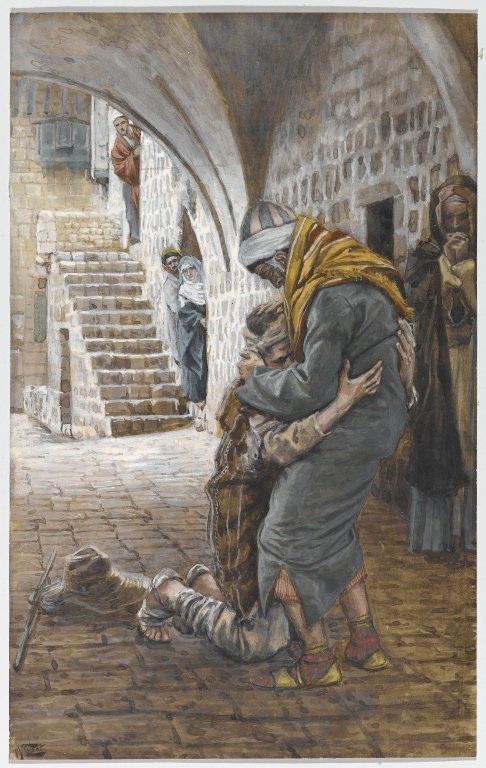
a Sermon for Lent 4C
Text: Luke 15:1-3, 11b-32
Two Sons
Most depictions of this story focus on the first half: the sinful son, the return to the farm, the generosity and mercy of the father, and the embrace. It is a wonderful and evocative image. I have a book full of these images, art crafted to capture this sense of forgiveness and this moment of reconciliation. Come take a look at it in the Fellowship Hall after the service.
We have historically referred to this story as the Parable of the Prodigal Son: a title that centers our attention on the young man’s departure and return. But the father has two sons and they both play prominent roles in the story.
One leaves to explore the world. He returns poor and desperate.
The other stays. His brother’s return exposes the bitterness and jealousy that lives within him.
As long as we focus on the father’s mercy toward the younger son, we can ignore the hostility festering in the elder son’s heart for that very act of mercy.
Jealous much, Bro?
Jesus tells this story, and its companion parables of the lost sheep and lost coin, in response to the Pharisees, who bitterly condemned Jesus for hanging out with the riffraff.
In the church, many of us have too eagerly played the part of the elder son, condemning our siblings for their behavior and expressing outrage at their return and ensuing forgiveness.
Rather than explore the world, we have stayed behind out of a sense of duty and obligation. We have maintained the practices of our parents with little to show for it. We have propped up the church while our youth have abandoned us.
We are angry. At them. At GOD. Where is the loyalty? Where is our mercy?
All that anger is really just jealousy. We are jealous that they get to sleep in. They don’t have to prop up a dying institution. They aren’t burdened with that history. They are free.
The true portrait of sin
This, of course, is why the elder son rejects the father in the second half. He is jealous of his little brother, not just for the fatted calf—but because he left.
“For all these years I have been working like a slave for you”.
He felt trapped and overwhelmed.
And yet the Father changes this narrative. He is not the master and his son is not a slave. They are partners. All of this is mine and yours. This whole time, we’ve been in this together.
This isn’t about competition or equality—it isn’t about brother against brother. One thing trumps that stuff: a son was dead and is now alive.
This is the lesson Jesus gives the Pharisees. As John Henson noted this week:
It was the elder son, not the narrator, who alleged that his brother spent his time with prostitutes. So it seems did Jesus, as the Pharisees noticed.
Jesus teaches that the Pharisees’ concern isn’t really about ritual purity, it really never is, but instead about jealousy and the perception of fairness. What He is concerned with, on the other hand, is celebrating that the lost have been found, the dead are alive!
Finding our little brothers
It seems that the church was once full of younger and elder sons. But now, so many of us are elders, jealous of GOD’s preference for the poor and the outcast; the foolish and the adventurous; the passionate and humbled. Jealous of the freedom our youths possess. And yet sad at our separation, we long to have the whole family under one roof. We have both of these emotions.
Just as the father explains to the elder son, we aren’t trapped here. We aren’t locked inside this building, stuck in a perpetual loop, attempting to recreate the Boom 50’s. We never were. And GOD doesn’t love us more for staying and maintaining. We aren’t the good kids. Make no mistake: we aren’t doing this for GOD, but for ourselves.
What GOD does want is a party. A big, frivolous, pull-out-all-the-stops party. A ridiculous party. An extravagant party. An irresponsible party. A time and a space to let our hair down and celebrate the miraculous return of the lost. To throw our concerns and jealousies and obsessions out the window and party down. The very second the lost are found.
We know that we are free. Free to leave the farm, to go out into the world, and search. To search for what is missing from our lives: the dead and disappeared: our lost brothers and sisters. To change our role in the story. To truly celebrate that the dead have come to life! Now is the time!
[also check out this post from earlier in the week about this story.]
Leave a Reply